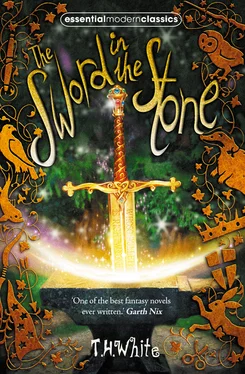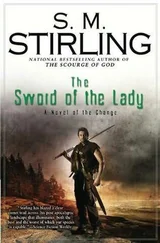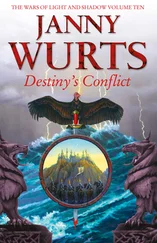If you look down and are not frightened of heights (the society for the Preservation of This and That have put up some excellent railings to preserve you from tumbling over), you can see the whole anatomy of the inner court laid out beneath you like a map. You can see the chapel, now quite open to its god, and the windows of the great hall with the solar over it. You can see the shafts of the huge chimneys and how cunningly the side flues were contrived to enter them, and the little private closets now public, and the enormous kitchen. If you are a sensible person, you will spend days there, possibly weeks, working out for yourself by detection which were the stables, which the mews, where were the cow byres, the armoury, the lofts, the well, the smithy, the kennel, the soldiers’ quarters, the priest’s room, and my lord’s and lady’s chambers. Then it will all grow about you again. The little people – they were much smaller than we are, and it would be a job for most of us to get inside the few bits of their armour and old gloves that remain – will hurry about in the sunshine, the sheep will baa as they always did, and perhaps from Wales there will come the ffff-putt of the triple-feathered arrow which looks as if it had never moved.
This place was of course, a complete paradise for a boy to be in. The Wart ran about it like a rabbit in its own complicated labyrinth. He knew everything, everywhere, all the special smells, good climbs, soft lairs, secret hiding-places, jumps, slides, nooks, larders and blisses. For every season he had the best place like a cat, and he yelled and ran and fought and upset people and snoozed and daydreamed and pretended he was a Knight, without ever stopping. Just now he was in the kennel.
People in those days had rather different ideas about the training of dogs to what we have today. They did it more by love than strictness. Imagine a modern M. F. H. going to bed with his hounds, and yet Flavius Arrianus says that it is “Best of all if they can sleep with a person because it makes them more human and because they rejoice in the company of human beings: also if they have had a restless night or been internally upset, you will know of it and will not use them to hunt next day.” In Sir Ector’s kennel there was a special boy, called the Dog Boy, who lived with the hounds day and night. He was a sort of head hound, and it was his business to take them out every day for walks, to pull thorns out of their feet, keep cankers out of their ears, bind the smaller bones that got dislocated, dose them for worms, isolate and nurse them in distemper, arbitrate in their quarrels and sleep curled up among them at night. If one more learned quotation may be excused, this is how the Duke of York who was killed at Agincourt described such a boy in his Master of Game : “Also I will teach the child to lead out the hounds to scombre twice in the day in the morning and in the evening, so that the sun be up, especially in winter. Then should he let them run and play long in a meadow in the sun, and then comb every hound after the other, and wipe them with a great wisp of straw, and this he shall do every morning. And then he shall lead them into some fair place where tender grass grows as corn and other things, that therewith they may feed themselves as if it is medicine for them.” Thus, since the boy’s “heart and his business be with the hounds,” the hounds themselves become “Goodly and kindly and clean, glad and joyful and playful, and goodly to all manner of folks save to the wild beasts to whom they should be fierce, eager and spiteful.”
Sir Ector’s dog-boy was none other than the one who had had his nose bitten off by the terrible Wat. Not having a nose like a human, and being, moreover, subjected to stone-throwing by the other village children, he had become more comfortable with animals. He talked to them, not in baby-talk like a maiden lady, but correctly in their own growls and barks. They all loved him very much, and revered him for taking thorns out of their toes, and came to him with their little troubles at once. He always understood immediately what was wrong, and generally he could put it right. It was nice for the dogs to have their god with them, in visible form.
The Wart was fond of the Dog Boy, and thought him very clever to be able to do all these things with animals – for he could make them do almost anything just by moving his hands – while the Dog Boy loved the Wart in much the same way as his dogs loved him, and thought the Wart was almost holy because he could read and write. They spent much of their time together, rolling about with the dogs in the kennel.
The kennel was on the ground floor, near the mews, with a loft above it, so that it should be cool in summer and warm in winter. The hounds were alaunts, gaze-hounds, lymers and braches. They were called Clumsy, Trowneer, Phoebe, Colle, Gerland, Talbot, Luath, Luffra, Apollon, Orthros, Bran, Gelert, Bounce, Boy, Lion, Bungey, Toby and Diamond. The Wart’s own special one was called Cavall, and he happened to be licking Cavall’s nose – not the other way about – when Merlyn came in and found him.
“That will come to be regarded as an insanitary habit,” said Merlyn, “though I can’t see it myself. After all, God made the creature’s nose just as well as he made your tongue.
“If not better,” added the philosopher pensively.
The Wart did not know what Merlyn was talking about, but he liked him to talk. He did not like the grown-ups who talked down to him like a baby, but the ones who just went on talking in their usual way, leaving him to leap along in their wake, jumping at meanings, guessing, clutching at known words, and chuckling at complicated jokes as they suddenly dawned. He had the glee of the porpoise then, pouring and leaping through strange seas.
“Shall we go out?” asked Merlyn. “I think it is about time we began our lessons.”
The Wart’s heart sank at this. His tutor had been there a month, and it was now August, but they had done no lessons so far. Now he suddenly remembered that this was what Merlyn was for, and he thought with dread of Summulae Logicales and the filthy astrolabe. He knew that it had to be borne, however, and got up obediently enough, after giving Cavall a last reluctant pat. He thought that it might not be so bad with Merlyn, who might be able to make even the old Organon interesting, particularly if he would do some magic.
They went out into the courtyard, into a sun so burning that the heat of haymaking seemed to have been nothing. It was baking. The thunder-clouds which usually go with hot weather were there, high columns of cumulus with glaring edges, but there was not going to be any thunder. It was too hot even for that. “If only,” thought the Wart, “I did not have to go into a stuffy classroom, but could take off my clothes and swim in the moat.”
They crossed the courtyard, having almost to take deep breaths before they darted across it, as if they were going quickly through an oven. The shade of the gatehouse was cool, but the barbican, with its close walls, was hottest of all. In one last dash across the desert they had achieved the draw-bridge – could Merlyn have guessed what he was thinking about? – and were staring down into the moat.
It was the season of water-lilies. If Sir Ector had not kept one section free of them for the boys’ bathing, all the water would have been covered. As it was, about twenty yards on each side of the bridge were cut each year, and you could dive in from the bridge itself. The moat was quite deep. It was used as a stew, so that the inhabitants of the castle could have fish on Fridays, and for this reason the architects had been careful not to let the drains and sewers run into it. It was stocked with fish every year.
“I wish I was a fish,’” said the Wart.
Читать дальше












